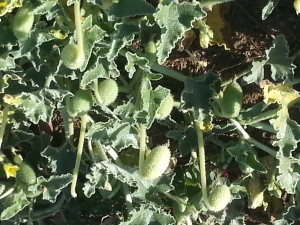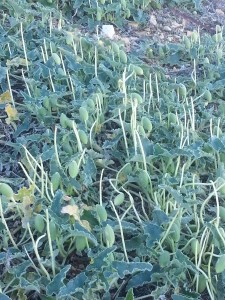Of Good Deeds and Donkey Scum
Of Good Deeds and Donkey Scum
As I was taking my daily walk around my hometown of Har Adar the other day, I came across a weird plant that grows wild in the Galilee and Judean Mountains – as well as in urban abandoned lots, junkyards and cemeteries. It’s called the “exploding cucumber.” Of course it is. It lies there hugging the ground, looking as innocent as you please, with pretty yellow flowers to boot. But if you step on it, kick it or even touch it, it will explode – literally – catapulting its seeds into the wind. That’s what ensures its survival, botanists tell us.

The exploding cucumber (Ecballium elaterium). Late October 2014: Most of the pods are still not ready to pop.
In the Mishnah, in a discussion about how to hang on to ritual purity, an issue that intensely preoccupied the ancient Jewish sages, they note that the “squirting cucumber” as they called it “gives passage to uncleanliness and serves as a screen against it” (Mishnah, Ohalot 8,1). They might have gotten wrapped up in this because of the plant’s prevalence in cemeteries, where ritual impurity from contact with the dead was considered serious risk.
The innards of this plant, which in Hebrew goes by the evocative name yeroket hehamor – “donkey scum” – is poisonous according to botanists. Yet, like many toxins, they say that in the right dosage it can be therapeutic; in folk medicine the exploding cucumber is used in treating jaundice, cataracts, ear and skin ailments.
Call me a masochist, but on my morning walk I like to listen to Israel Radio’s daily talk show, where interviewers elicit outrageous statements by the great and powerful wizards who control our lives. Or call me hope-filled when the show interviews people with ingenious and inspiring startups, studies and initiatives for a better society. On a recent walk, right at the moment I was catching my breath and surrendering to the urge to give our botanical bombshell a little nudge, the radio interviewee was Prof. Oren Kaplan, of the College of Management in Rishon Letzion, Israel. His research: how do people’s reports of good deeds affect others. The study showed empirically what most of us realize instinctively – that good deeds are “catching” – hearing about them spurs some people to do good deeds themselves. However, according to Oren’s data there’s a catch: Once a person had done a good deed, there’s some tendency to feel smug enough to skate right on by the next opportunity to do good.
But I also heard the professor say that morning that he believes we can fight that tendency and go for the good. We can go either way, he says. I say, we can be a “screen for cleanliness or uncleanliness.” Genesis 8:21 has a reflection of that: “The imagination of a man’s heart is evil from his youth,” God says, but right then and there vows never again to punish all of us for being that way.
That day as I watched the lowly plant disperse its seeds so vigorously at the merest touch, I thought: the Exploding Cucumber. Yes, that definitely works in the part of the world. There are other plants, in the Holy Land and elsewhere, that disperse their seeds through the air more gently, like the milk thistle, or the make-a-wish dandelion. But I like to think of our exploding cucumber as a symbol of the enormous energy we need to keep on doing good. We need this very badly, in a world where we have allowed the power to impact larger events to be taken from us by those who have let impurity through the screen, a world where every one of us “great” or “small” has the capacity to hurt or heal in a heartbeat.
Read more about the unusual plants and spices of the Bible in Food at the time of the Bible: From Adam’s Apple to the Last Supper.
As for hope, leadership and losing both, read The Scroll



I am delighted to see this blog. Our group had the privilege of having Miriam as a guide while in Israel in 2001. What a blessing – I have not forgotten the tender heart she has for the land and what it can teach us. So I look forward to spending time at this site in the days ahead.
Israel is in a very troubled situation and I pray much for her safety and the well-being of the Jewish people. Miriam’s comment, ‘But I like to think of our exploding cucumber as a symbol of the enormous energy we need to keep on doing good.’ illustrates the heart of the Jewish people throughout their history. God has given them an enormous energy for doing good. We can easily recap the lists of achievements in medicine, computer technology, survival… just to mention a few. My prayer is for the world to ‘wake-up’ and to see how important their existence is to all mankind. Pray for the peace of Jerusalem!! Shalom to you dear Miriam, you have again brought fresh thoughts to ponder. Thank you!
Amen and Amen, Thank you Georjean!
Thank you Georgjean! What a blessing to know the sisters are reading and enjoying my website. You brought such friendship and love when you came to Israel and I will never forget your visit. Fond holiday regards from me and my family to you and yours.